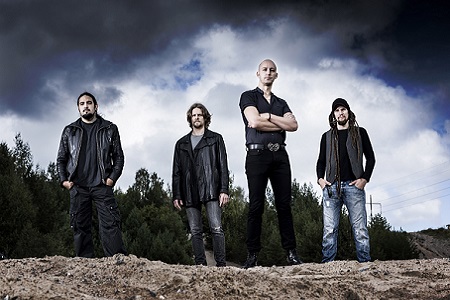The unfortunate consequence of starting a new band after leaving a popular, quasi-legendary band is that said previous band will always come up in the discussion. Soen, as it stands, will forever be the band “featuring former Opeth drummer Martin Lopez.” Some may see it as a good thing – instant recognition. Others (including the band) probably see it as a long-term detriment to establishing their identity, even though both of the album’s the band has to their name (2012’s Cognitive and this year’s Tellurian) couldn’t be more un-Opeth like. Actually, Soen operated more like a Scandinavian Tool on Cognitive, but have promptly shed such influences for a rich, melodic, and complex body of work in the form of Tellurian, which leads us to today…
Indeed Tellurian is a must-hear for those reasons, as well as the enticing vocals of Joel Ekelof, whose soft timber, soothing range, and remarkable pitch give Soen a weapon few bands have. Combined with the busy drum work of Lopez, and the smart, brash riff approach of guitarist Kim Platbarzdis, and Tellurian sneaks in as one of the year’s real progressive metal sleepers. Here to tell us about is bassist Stefan Stenberg, who recently had the pleasure of replacing bass legend Steve DiGiorgio. Read on…
Dead Rhetoric: Two years from your debut, how has time shaped your perspective on the album? Do you think the band was still finding its way?
Stefan Stenberg: Definitely and we still are, even if we are much closer to reaching our own identity. We are very pleased with Cognitive; it has its flaws of course but all and all to be a debut, it´s a good record.
Dead Rhetoric: What has been the biggest obstacle for Soen thus far? Overcoming the stigma of having “ex-members” of certain bands in the ranks?
Stenberg: The biggest obstacle has surely been allocating time to work on the album. The fact of the ex-members is probably more important outside the band.
Dead Rhetoric: What happened with Steve? Was his schedule too much of an interference?
Stenberg: That’s pretty much the boring but true answer. Scheduling and logistics. He’s still a friend and hopefully we’ll get to play together again someday.
Dead Rhetoric: Going into the songwriting of Tellurian, what was the goal? The album feels so much more melodic and memorable…
Stenberg: The goal was to get a new album done, the best way we could. The differences come from where we stand musically today. There was no forced idea that things should sound one or another way. That gave us more freedom and confidence to let all ideas come out.
Dead Rhetoric: Do you think the new album is less about the band’s influences and more about everyone’s talent than Cognitive?
Stenberg: You´re always affected by what you’re listening to, and what you like. If you begin to think about how you don’t want to sound like what influences you, you’ll lose the honesty just as much as if you’re trying to do a “rip-off.” So in that sense there is no big difference.
Dead Rhetoric: Joel’s vocals on some of these songs (i.e. “Kuraman” instantly comes to mind) are fantastic. Speak to his development as a vocalist, and his ability to add his own stamp on these songs.
Stenberg: Joel is developing constantly as a singer and as a musician. This kind of singing was quite new for him and he needed some time to find his own identity, which he has done in Tellurian. Also the odd rhythms are locking quite fast and that gives him a lot more versatility while writing vocal lines.
Dead Rhetoric: What’s your favorite moment on the album? My vote is either “Tabula Rasa” or “Void.”
Stenberg: It’s really hard to pick, it’s a bit like picking a favorite child. They are all meaningful in their own ways, otherwise they wouldn’t have been on the album.
Dead Rhetoric: You’re going to get a wide array of comments regarding the album art. Do you think people will understand the implications of the cover and album title?
Stenberg: As long as it means something to people, the purpose is filled. It is an incredible piece of art, loaded with a lot of message, but it´s up to the beholder to put their own meaning into it.
Dead Rhetoric: Are you comfortable being labeled a “progressive metal” band?
Stenberg: There is always need for people to categorize things and even though we don’t think that would be the main labelling for us, it’s clear that there is an overlap.
Dead Rhetoric: Now that you have a new, stable lineup, what’s the live approach going to be?
Stenberg: Like it’s been so far, but better. Fact is that, I’ve been playing with the band since 2012 already, so not much will change besides a new keyboards player joining us for the live shows.
Dead Rhetoric: Finally, what’s on deck for the rest of 2014?
Stenberg: We’re looking to either tour or do single gigs as soon as possible, some might even fit into this year we hope. Other than that, we`re discussing the possibility to tour supporting


